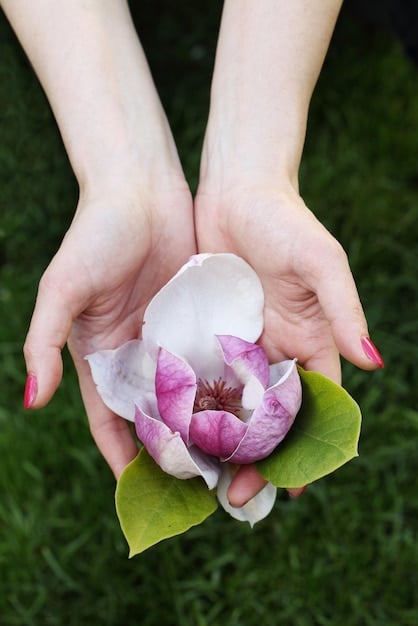Unlock Your Potential: The Benefits of Mindfulness in 10 Minutes

The Benefits of Mindfulness: How 10 Minutes a Day Can Transform Your Health includes stress reduction, improved focus, and emotional regulation. Incorporating brief daily mindfulness practices can significantly enhance overall well-being and mental health.
In today’s fast-paced world, finding moments of peace and clarity can seem like a luxury. However, dedicating just 10 minutes a day to mindfulness can offer profound The Benefits of Mindfulness: How 10 Minutes a Day Can Transform Your Health, impacting your physical and mental well-being.
Ready to discover how a simple practice can lead to a significant transformation? Let’s explore the power of mindfulness and how it can reshape your life.
Understanding the Essence of Mindfulness
Mindfulness, at its core, is about being present. It’s the practice of paying attention to the current moment without judgment. This involves observing your thoughts, feelings, and sensations as they arise and pass, without getting carried away by them.
What is Mindfulness Meditation?
Mindfulness meditation involves focusing on your breath, body sensations, or sounds around you. The goal isn’t to clear your mind, but rather to notice when your attention wanders and gently guide it back to your chosen focus.
- Reduces Stress: Mindfulness meditation activates the parasympathetic nervous system, promoting relaxation.
- Enhances Focus: Regular practice strengthens your ability to concentrate and stay on task.
- Improves Emotional Regulation: Mindfulness helps you become more aware of your emotions, allowing you to respond thoughtfully rather than react impulsively.
Mindfulness isn’t just a fleeting trend; it’s a powerful tool backed by research and embraced by many for its transformative effects. It’s about cultivating a new relationship with your thoughts and feelings, enabling you to live with greater intention and ease.

The Physical Benefits of Daily Mindfulness
While mindfulness is often associated with mental well-being, its impact extends to the physical realm as well. Regular practice can lead to a range of physical benefits, contributing to overall health and vitality.
Lowering Blood Pressure
Studies have shown that mindfulness meditation can help lower blood pressure. By reducing stress and promoting relaxation, mindfulness helps regulate the body’s stress response, leading to healthier blood pressure levels.
Boosting the Immune System
Mindfulness can also strengthen the immune system. Research suggests that mindfulness practices increase the activity of certain immune cells, enhancing the body’s ability to fight off illness and infection.
Reducing Chronic Pain
For those struggling with chronic pain, mindfulness can offer relief. By changing your relationship with pain sensations, mindfulness helps you manage discomfort and improve your quality of life.
In conclusion, the physical The Benefits of Mindfulness: How 10 Minutes a Day Can Transform Your Health are undeniable. From reducing blood pressure to boosting the immune system and alleviating chronic pain, mindfulness offers a holistic approach to physical well-being.
Mental and Emotional Well-being Through Mindfulness
The mental and emotional benefits of mindfulness are vast and well-documented. By practicing mindfulness, you can cultivate greater self-awareness, emotional regulation, and overall psychological well-being.
Reducing Anxiety and Depression
Mindfulness is a powerful tool for managing anxiety and depression. By focusing on the present moment and accepting thoughts and feelings without judgment, mindfulness helps break the cycle of negative thinking.
Improving Sleep Quality
Mindfulness can also improve sleep quality. By calming the mind and reducing racing thoughts, mindfulness creates the conditions for restful and rejuvenating sleep.
Enhancing Focus and Concentration
Regular mindfulness practice strengthens your ability to focus and concentrate. By training your mind to stay present, you can improve your attention span and productivity.
The practice of mindfulness offers a pathway to greater mental and emotional resilience. Whether you’re seeking to reduce anxiety, improve sleep, or enhance focus, mindfulness can help you achieve your goals.

Simple Mindfulness Techniques for Beginners
Getting started with mindfulness doesn’t have to be complicated. There are several simple techniques that beginners can use to incorporate mindfulness into their daily routines.
Breath Awareness
One of the simplest mindfulness techniques is breath awareness. Simply focus on your breath as it enters and leaves your body. Notice the sensation of the air passing through your nostrils or the rise and fall of your chest.
- Find a quiet place where you won’t be disturbed.
- Sit comfortably with your back straight but not stiff.
- Close your eyes or lower your gaze.
- Focus on your breath, noticing the sensations as you inhale and exhale.
- When your mind wanders, gently guide it back to your breath.
Body Scan Meditation
Body scan meditation involves bringing awareness to different parts of your body. Start by focusing on your toes and gradually move your attention up through your body, noticing any sensations you experience.
Mindful Walking
Mindful walking involves paying attention to the sensation of your feet making contact with the ground. Notice the movement of your body as you walk, and try to stay present in each step.
Exploring these simple yet effective tools, individuals can seamlessly integrate mindfulness into their lives, unlocking the myriad benefits it offers for overall well-being.
Creating a Daily Mindfulness Routine
Establishing a daily mindfulness routine can be easier than you think. By incorporating mindfulness into your everyday activities, you can reap the benefits of this practice consistently.
Start Small
Begin with just 5-10 minutes of mindfulness each day. As you become more comfortable with the practice, you can gradually increase the duration.
Choose a Consistent Time
Select a time of day when you’re least likely to be interrupted. Morning or evening can be ideal times for mindfulness practice.
Integrate Mindfulness into Daily Activities
Practice mindfulness while performing routine tasks such as brushing your teeth, washing dishes, or commuting to work. Pay attention to the sensations and experiences of the present moment.
Creating a daily mindfulness routine is a simple yet powerful way to enhance your well-being. The key is to start small, be consistent, and integrate mindfulness into your everyday life.
Overcoming Challenges in Mindfulness Practice
Like any new skill, mindfulness practice can present challenges. It’s important to be patient with yourself and to approach these challenges with compassion and understanding.
Dealing With a Wandering Mind
It’s normal for your mind to wander during mindfulness practice. When this happens, simply acknowledge the thought or feeling without judgment and gently guide your attention back to your chosen focus.
Managing Difficult Emotions
Mindfulness can sometimes bring up difficult emotions. If this happens, allow yourself to feel the emotion without getting carried away by it. Remember to be kind to yourself and to seek support if needed.
In conclusion, learning to navigate the challenges of mindfulness practice is a crucial step towards unlocking its transformative potential in daily life.
| Key Aspect | Brief Description |
|---|---|
| 🧘♀️ Stress Reduction | Mindfulness helps activate the parasympathetic nervous system. |
| 🧠 Enhanced Focus | Regular practice improves concentration and attention span. |
| 😌 Emotional Regulation | Mindfulness aids in managing emotions thoughtfully. |
| 💪 Immune Boost | Mindfulness increases the activity of immune cells. |
Frequently Asked Questions About Mindfulness
Mindfulness enhances focus, reduces stress, and improves emotional regulation. It leads to increased self-awareness and overall well-being.
Aim for daily practice, even if it’s just for a few minutes. Consistency is key to experiencing the full benefits of mindfulness.
Yes, mindfulness is known to reduce anxiety by promoting relaxation and increasing awareness of thoughts and feelings.
Mindfulness is a quality of being present, while meditation is a practice to cultivate that quality. Mindfulness can be part of meditation but also applied in daily life.
It’s normal for the mind to wander. Gently redirect your attention back to your breath or chosen focus without judgment.
Conclusion
Incorporating mindfulness into your daily life, even for just 10 minutes, can lead to significant improvements in your health and well-being. The transformative The Benefits of Mindfulness: How 10 Minutes a Day Can Transform Your Health are within reach with consistent practice.
By embracing mindfulness, you can unlock your potential and live a more balanced and fulfilling life. So, start today and experience the difference that mindfulness can make.





